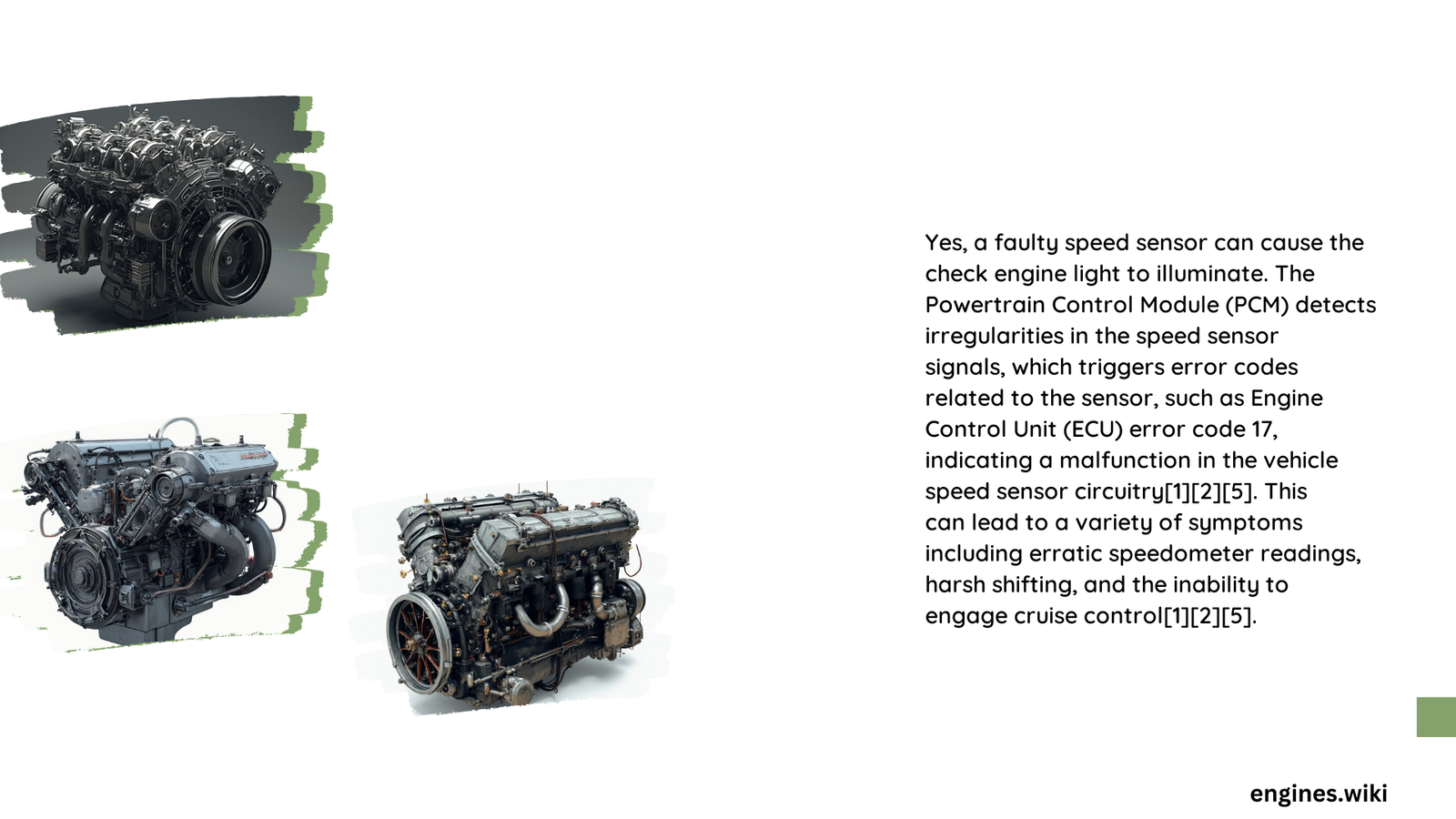A malfunctioning speed sensor can indeed cause your vehicle’s check engine light to illuminate, signaling potential transmission and performance complications. This critical sensor monitors vehicle speed and provides essential data to the engine control unit, and when it fails, it can trigger diagnostic trouble codes, disrupt transmission shifting, and compromise overall vehicle performance. Understanding the symptoms, diagnostic procedures, and potential repair strategies is crucial for maintaining your vehicle’s health and preventing costly damage.
What Triggers Check Engine Light with Speed Sensor Failure?
Speed sensors play a pivotal role in modern vehicle systems, acting as critical communication links between various automotive components. When these sensors malfunction, they can generate multiple diagnostic trouble codes that activate the check engine light.
Key Diagnostic Trouble Codes Related to Speed Sensor
| Code | Description | Potential Impact |
|---|---|---|
| P0500 | Vehicle Speed Sensor Malfunction | Speedometer inaccuracy |
| P0720 | Output Shaft Speed Sensor Circuit | Transmission shifting issues |
| P0721 | Speed Sensor Performance Problem | Erratic vehicle behavior |
| P0722 | No Signal from Speed Sensor | Complete sensor failure |
What Symptoms Indicate Speed Sensor Problems?

Vehicle owners might experience several distinctive symptoms when a speed sensor malfunctions:
- Erratic Speedometer Readings
- Needle jumping unexpectedly
- Inconsistent speed display
-
Complete speedometer failure
-
Transmission Performance Issues
- Harsh or unexpected gear shifts
- Delayed engagement of gears
-
Inability to shift smoothly
-
Cruise Control Malfunction
- Inability to maintain consistent speed
- Sudden acceleration or deceleration
- Complete cruise control failure
How Do Speed Sensors Impact Vehicle Performance?
Speed sensors are integral to multiple vehicle systems, including:
- Transmission Control
- Monitors gear shifting requirements
- Calculates optimal transmission performance
-
Ensures smooth power delivery
-
Engine Management
- Provides critical speed data to ECU
- Helps adjust fuel injection
-
Supports efficient engine operation
-
Anti-lock Braking System (ABS)
- Tracks wheel rotation speed
- Prevents wheel lock during braking
- Enhances vehicle stability
What Are Replacement Costs for Speed Sensors?
Repair costs can vary significantly based on vehicle make and model:
- Diagnostic Fee: $50 – $150
- Sensor Cost: $50 – $300
- Labor Charges: $75 – $150 per hour
- Total Repair Estimate: $200 – $750
How to Diagnose Speed Sensor Issues?
Professional diagnostic steps include:
- Use OBD-II scanner to read trouble codes
- Inspect sensor wiring and connections
- Test sensor voltage and signal output
- Verify sensor alignment and mounting
- Compare readings with manufacturer specifications
Can You Prevent Speed Sensor Failures?
Preventative maintenance strategies:
- Regular vehicle inspections
- Timely transmission fluid changes
- Avoid extreme driving conditions
- Address warning signs promptly
- Use high-quality replacement parts
When Should You Replace a Speed Sensor?
Replace your speed sensor if you experience:
– Persistent check engine light
– Multiple diagnostic trouble codes
– Consistent transmission performance issues
– Verified sensor malfunction through professional diagnosis
Conclusion
Understanding speed sensor functionality and potential failure modes empowers vehicle owners to address issues proactively, preventing more extensive and expensive repairs.
